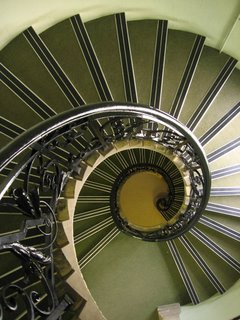 Everything aside from studying moved forward well today: working on taxes, dealing with the bank and college, and packing. I now have essentially everything that I don’t use many times a day packed into fruit boxes from Sainsbury’s. I also went for a solid forty minute bike ride, up the Cowley Road and back to Wadham. It is becoming a truism that I am never so productive in non-school areas as when some big school deadline is looming.
Everything aside from studying moved forward well today: working on taxes, dealing with the bank and college, and packing. I now have essentially everything that I don’t use many times a day packed into fruit boxes from Sainsbury’s. I also went for a solid forty minute bike ride, up the Cowley Road and back to Wadham. It is becoming a truism that I am never so productive in non-school areas as when some big school deadline is looming.
The practice exam plan is to write the thing immediately after moving my stuff to Church Walk on the morning of the 10th. I can start unpacking afterwards, after I have hand delivered it to Nuffield. That way, I will have all of tomorrow and Sunday to revise. Naturally, I will be less than entirely prepared when I write the practice exam. I will have another ten days afterwards and – critically – those ten days won’t include moving or the other miscellaneous projects that are cluttering my personal ecosystem.
To those who have received one of the letters I’ve written lately with a fountain pen: does it improve the legibility of my printing? If so, I may use it for the qualifying test, in place of the four-coloured ballpoint pens that are the workhorses of my note taking.
Tiny new toy incoming
I ordered a one gigabyte iPod Shuffle from the Apple Store today. I am sick of having nothing to listen to during my 20GB iPod’s frequent trips to service depots. Also, it only cost a bit more than the service charges NatWest imposed on me in exchange for a bank draft to give to Wadham. The tiny size and twelve hour battery life are selling points. I tried about twenty shops in Oxford, looking for one, and discovered that they cannot be had here for love or money. It should arrive early next week.
When you’re used to studying with music, it’s surprisingly difficult to do so without it. Naturally, trying to use my computer as a music source leads to inescapable distraction. Spending so long without a working iPod has also proven to me how intolerable human babies are. I am personally astounded that parents can endure such shrieking on a continual basis. It can only really be explained with the endorphins and other opium-like chemicals our brains and glands see fit to flood us with, in order to ease the process of procreation.
Within twenty years, there will doubtless be a sub-dermal version of the iPod that charges using energy it draws from your body and downloads songs wirelessly off your iTunes library, which will probably be stored online by then. It will be a good day when that comes about. Hopefully, it won’t be necessary to ship one’s arm back to Apple every year or so, because the hard drive keeps failing.
PS. Lee Jones has a good post sharing my indignation about the Department of Politics and International Relations actually being commended by the ESRC for our quantitative methods training.
